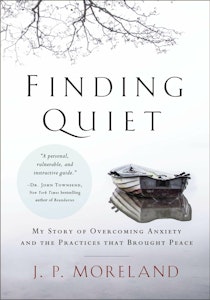 Excerpt from Finding Quiet
Excerpt from Finding Quiet
If you or a loved one has struggled with significant anxiety, you or your loved one know what it is like to feel isolated, different (in a bad way), hopeless, and full of fear. As a result, we need to learn a few things about our enemy. First, you are not alone. In 2003, 15 percent of the US population between the ages of eighteen and fifty-four (forty million people) suffered from an anxiety disorder. Since then, the numbers have increased. Anxiety disorders are the most common mental illness in America, and they affect women and teenagers especially hard (besides posttraumatic stress disorder, women are twice as likely as men to have an anxiety disorder). More generally, anxiety disorders affect around one out of every thirteen people.
In 2017, Dr. Joseph Mercola had this to say:
Anxiety is the new depression, with more than half of all American college students reporting anxiety. Recent research shows anxiety — characterized by constant and overwhelming worry and fear — is now 800 percent more prevalent than all forms of cancer.
A 2016 report by the Center for Collegiate Mental Health at Penn State confirmed the trend, finding anxiety and depression are the most common concerns among college students who seek counseling. Data from the National Institute of Mental Health (NIMH) suggests the prevalence of anxiety disorders in the U.S. may be as high as 40 million, or about 18 percent of the population over the age of 18, making it the most common mental illness in the nation.
I am among those who do not believe that “the percentage of people who have anxiety has always held pretty constant; rather, it’s just that today we’re more open to speaking about it.” No, I am convinced that the anxiety (and depression) rate is higher today than it has ever been. Why? Because the conditions present today in American culture — e.g., the rapid pace at which we live, the bombardment we receive from all kinds of readily available technology, the isolation we experience in a hyperindividualistic society — are so extreme that we are living with stress, stress, and more stress. Indeed, we are so used to being under stress that we hardly recognize it much of the time. One of the greatest, if not the greatest, causes of serious anxiety is stress.
Despite all this, there is good news: statistics also show there is reasonable hope to significantly minimize or even get rid of disabling anxiety if you do the right things.
There is a very important coping device in these statistics. I’m alone; I’m a sicko; I’m a hopeless cause; I’m a failure as a Christian—the next time thoughts like these come into your awareness, remember that they are lies! Change your self-talk to reflect the truth: You are a normal member of society, along with millions like you, and you live in a very stressful culture that is so individualistic that community and friendships are rare. Yet if you do the right things, it is quite likely you will make solid progress.
Call this to mind if you are in need and feel alone or picked on by God:
No trial or hardship has overtaken you except what is common to mankind.
– 1 Corinthians 10:13, my paraphrase
Resist [the devil], standing firm in the faith, because you know that the family of believers throughout the world is undergoing the same kind of sufferings.
– 1 Peter 5:9
Rather than isolating us from one another, our suffering — especially suffering from anxiety or depression — can connect us with others. As psychologist Kristin Neff wisely observes, “When we’re in touch with our common humanity, we remember that feelings of inadequacy and disappointment are shared by all. This is what distinguishes self-compassion from self-pity. Whereas self-pity says ‘poor me,’ self-compassion remembers that everyone suffers, and it offers comfort because everyone is human. The pain I feel in difficult times is the same pain that you feel in difficult times.”
Neff’s comments remind us that we dare not let anxiety or depression isolate us from others. In point of fact, we need just the opposite. Group therapy, a support group at church, and deepening relationships with safe and caring friends and family are all important in getting well.
What is anxiety? It is a feeling of uneasiness, apprehension, or nervousness. It always has a trigger, but we often don’t know what that trigger is or what we’re anxious about (in chapter 3 of Finding Quiet, I offer practical steps to get better at this). There are several different kinds of anxiety disorder, including generalized anxiety disorder, social anxiety, phobic, posttraumatic stress, and separation anxiety disorders. I am not qualified to address the specific aspects of these disorders.
But be encouraged. I have learned some things about generalized anxiety disorder (GAD), panic disorder, and obsessive-compulsive disorder that you may find helpful. And much of it can be useful for certain aspects of other anxiety disorders as well.
What causes anxiety? I offer this list so you can engage in an exercise. You may want to read slowly through the list with pen and paper in hand, note the factor or factors that seem most relevant to your situation (rank them in order of importance if you can), and jot down some initial thoughts about what you can do to engage properly those factors:
- genetic predispositions
- parenting (overprotective, overcontrollers, inconsistent responders)
- early childhood experiences that fostered shame or insecurity
- current lifestyle (especially stress, stress, stress; but also unanticipated threats, escalating demands, confidence killers, terrorizing trauma, significant change)
- the inability to predict or control the future as much as you would like
Do one or more of these factors apply to you? Most likely, the answer is yes. Then you can try to get to the root of these factors.
In addition to defining anxiety, listing its different forms, and noting many of its causes, there is another aspect of anxiety I found important to know: anxiety is a surface feeling that masks the deeper feelings that are most likely the real issue you are dealing with — embarrassment, fear, grief, helplessness, hurt, loneliness, or sadness. Feelings are like bubbles — we need to let them rise to the surface (not stuff them or fight them) and be open to what surfaces. Then we can experience and release them as they move through us like letting air out of a balloon. Feelings may also be likened to waves. We needn’t be afraid the wave will swell and overwhelm us, but can instead let it pass by and ride it out. The feeling touches us and will eventually leave. It is especially helpful to remember this while experiencing a panic attack.
It is my heartfelt passion that God will use Finding Quiet to point people who are suffering anxiety to sources of relief. But that won’t happen if you read through the book without reflecting on your own experiences. So again, I urge you to look at the list of deeper feelings and seek to discover which apply to you and why.
Finally, don’t waste your suffering. Anxiety or depression can be occasions for formation or deformation, for becoming stronger in the long run or weaker. So do what you can — even if it’s a baby step — to resolve to let all of this work together for your good. And the good news is that studies have demonstrated beyond a reasonable doubt that you can substantially lessen or get rid of your anxiety and increase your happiness.
Related Podcast
Taken from Finding Quiet by J.P. Moreland. Copyright ©2019 by J.P. Moreland. Used by permission of Zondervan. www.zondervan.com. Photo by Paolo Nicolello on Unsplash
Text First Published May 2019 · Last Featured on Renovare.org June 2021


